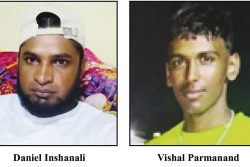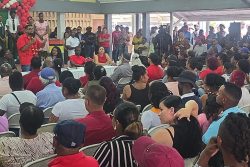In our editorial of Monday, March 14, we had drawn attention to the fact that the Education Television Broadcasting Service was being set up in breach of the understanding reached during the dialogue between President Jagdeo and the late Mr Hoyte, and the continuation of that dialogue with the latter’s successor, Mr Robert Corbin. As it is, there is still no broadcast legislation on the statute books, and no broadcast authority in place, and consequently there should be no new channels. The government’s decision to act duplicitously without prior consultations and allocate portions of the spectrum for an educational channel and, it might be added, a religious one as well, was no doubt made easier by the perception that the opposition would not want to appear to be hostile to either of these. The rush by the administration to get the educational programmes on the air, of course, is all about elections, otherwise it would have taken its time to secure the co-operation of the opposition in the first instance.
The administration’s calculation that the PNCR, at least, would not oppose the idea was confirmed last week, when the party indicated it supported the channel in principle. However, it called on the Ministry of Education to revisit the programme content, because the service had been launched before it was ready. The party claimed that teachers had been recorded in class without being given notice, and that those who were featured on the opening programme had not even been told they would be on the air.
Furthermore, the PNCR alleged, after a lesson is taped a teacher is then informed that they must prepare another sixty lessons although there has been no discussion about a contract or remuneration. If true, then this at least is a matter which should invite the attention of the Guyana Teachers’ Union.
The main opposition was reported as going on to say that the lessons and live material had not been properly edited, and they made reference to the fact that a number of old TV programmes including quizzes, debates and maths lessons were being repeated. While the party considered that the imported programming was good, it was nevertheless of the view that not enough planning had gone into setting up the service.
If what the PNCR is saying has any substance, then not only has the government thumbed its nose at the dialogue process, but it has done so for the sake of a poorly conceptualised product. The first thing to be observed is that 6am to 11pm is a lot of TV hours to fill, and while the foreign programming will account for some of it, it will not be easy generating enough quality local material to fill the rest. This is not to say it could not be done; it is merely to observe that putting together programmes which will hold the interest of teachers and pupils, and assist them from an educational point of view not only requires specialised skills, but is also time-consuming, and it is difficult to believe that NCERD has had enough time to generate a large number of original programme sequences for the various age groups.
Given the haste involved, it is not difficult to believe that those responsible for the new channel have been forced to resort to taping some live lessons for broadcast. If this is indeed so, it is something which would soon be apparent to viewers. Certainly previous educational programmes on channels such as NCN, for example, had opted for this approach, but it is hardly a method which takes best advantage of the medium, or is likely to hold the attention of those for whom it is designed. As for the repeats referred to by the PNCR, some of those will be necessary given the many time slots to be filled, and often– depending on the programme concerned – will in any case be pedagogically desirable.
Dr Seeta Shah Roath, the head of the service was quoted in our edition of April 16 as saying that the intention was “not for the technology to take over the lesson or replace the teacher.” The purpose was, she was reported as saying, to provide instructional material and teach the teachers how to integrate the material into their lesson planning. This sounds all very palatable, although what it means translated into practice remains to be seen.
Similarly, the report went on to quote her as saying, “Because we are producing and acquiring content, we are using the content expert combined with the curriculum guide and instructional decision methodology and we [are] combining all of that to produce programmes that are pedagogical and intended to meet specific outcomes.” From the layperson’s – and even the expert’s − point of view this is hardly enlightening, and those involved in or with an interest in education will probably have to sit down and watch the programmes to get a feel of what is actually being done.
In contradistinction to the PNCR, Dr Roath told this newspaper that parents around the country had told her the quality of the programming was excellent and the content was appreciated. There is no reason to doubt her where this is concerned, although this view is not necessarily incompatible with that of the PNCR. Parents will be happy with any educational channel for their children, and will just assume that it is good for them, while the main opposition party will be looking at it from a more professional point of view.
Now that the government has betrayed the understanding of the dialogue process, one hopes it will not dismiss the PNCR’s concerns out of hand. This is not just about the PNCR, of course. Applicants for radio and TV licences who have been denied these, as well as the thousands who hoped they would be granted, not to mention the population at large, are entitled to see the detailed thinking behind the operation, and get an overview of specific content.
And since the whole exercise is supposedly for the benefit of the nation’s children, whatever the merit or otherwise of the PNCR’s claims, the authorities should be open to consultations with knowledgeable persons and groups in the society in addition to the parliamentary parties. The government’s belief in its own omniscience notwithstanding, it simply does not have a monopoly on expertise in this field. In the meantime, the hours should be reduced to make the channel more manageable.
They could then be extended as a bank of material is built up, and perceptions and suggestions from other sources are incorporated. There could be nothing more cynical than creating a channel which has been advertised as an aid to education for the purposes of a simple election gimmick.








